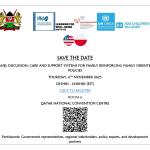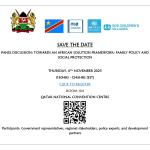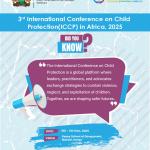FAQs
Families provide personalized, consistent, and loving care, which is essential for a child’s development. Research shows children in institutions are more likely to face developmental delays and abuse.
- Kinship care
- Foster care
- Guardianship
- Kafaalah
- Adoption
- Supported independent living
- Child-headed households (with external support)
Yes, but only as a last resort. The government is actively working to transition care and promote family- and community-based alternatives.
Support may include:
- Financial assistance
- Psychosocial support
- Training and mentorship
- Access to health and education services
Yes. Family tracing and reintegration is a key goal, provided it’s safe and in the child’s best interest.
Gatekeeping refers to the decision-making process that ensures children are only placed in alternative care when absolutely necessary, and the most suitable option is chosen.
Through:
- Legal frameworks (e.g., Children Act 2022)
- Monitoring and regulation of care providers
- Child participation in decisions affecting them
Communities help by:
- Identifying vulnerable children
- Supporting families with children under alternative care
- Monitoring child well-being
- Reducing stigma around non-parental care
Yes! Kenya has Guidelines for the Alternative Family Care of Children (2014) and Standard Operating Procedures (SOPs) 2022 to guide practitioners and caregivers.
You can explore resources like the Alternative Care FAQ Booklet or contact the Sub-County Children Officer in your locality. Alternatively, you can get more information through alternativefamilycare@socialprotection.go.ke
Trafficking in Persons (TiP), also known as human trafficking, is the recruitment, transportation, transfer, harbouring or receipt of persons for the purpose of exploitation, by means of the threat or use of force or other forms of coercion, of abduction, of fraud, of deception, of the abuse of power or of a position of vulnerability or of the giving or receiving of payments or benefits to achieve the consent of a person having control over another person.
The three elements required to meet the definitions of Trafficking in Persons (TIP) are;
- Act - recruitment, transportation, transfer, harbouring or receipt of persons (What is done).
- Means - threat or use of force or other forms of coercion, abduction, fraud, deception, the abuse of power or of a position of vulnerability or the giving or receiving of payments or benefits to achieve the consent of a person having control over another person. (How it is done).
- Purpose - exploitation (Why it is done).
Child trafficking is the recruitment, transportation, transfer, harbouring or receipt of child, for the purpose of exploitation. Please note that you just need to prove that there was an activity and exploitation to prove a case of child trafficking.
Trafficking in Persons is defined as the recruitment, transportation, transfer, harbouring or receipt of persons, by means of threat or use of force or other forms of coercion, of abduction, of fraud, of deception, of the abuse of power or of a position of vulnerability or of the giving or receiving of payments or benefits to achieve the consent of a person having control over another person, for the purpose of exploitation.
Smuggling of Migrants is the procurement in order to obtain, directly or indirectly, a financial or material benefit, of the illegal entry of a person into a State Party of which the person is not a national or a permanent resident.
Smuggling of Migrants involve procurement of a service for the illegal entry of a person into a country.
Both Trafficking in Persons and Smuggling of Migrants are profitable businesses involving human beings often run by criminal networks.
Anybody can be trafficked, children (girls and boys) and adults (men and women).
However, women and children are more vulnerable to trafficking than men.
Traffickers are persons who engage in the criminal activity of trafficking human beings. Often a trafficker is someone whom the victim knows on a personal basis, such as a family member, friend, romantic partner, or community member.
- Poverty
- Unemployment
- Low income
- Dysfunctional Families
- Promise of greener pastures
- Domestic violence
- Social exclusion
Children and adults are trafficked across international borders or within Kenya.
- Forced labour
- Sexual exploitation
- Child Labour
- Domestic Servitude
- Harvesting of Body Organs
- Involvement in Terrorist Groups and gangs
- Forced Marriage
- Child marriage
- Begging
- Drug trafficking
- Child soldiers
Children in the Streets, Orphans, Children on the move that are unaccompanied, children from poor backgrounds, Children in conflict areas, refugee children, missing children, and children in Charitable Children Institutions.
For adults it is mainly women between the ages of 21 to 28 years.
A victim of trafficking can be identified by anyone in the community. This include relatives, law enforcement agencies (Police, prosecution, immigration, Children Officers), Judicial Officers, social workers, local leaders such as chiefs, Labour Officers, recruitment agencies, medical staff, embassy and consulate workers, Civil Society Organizations, religious leaders, international organizations, community members, friends, hotel workers and transport operators.
The National Assistance Trust Fund for Victims of Trafficking in Persons offers support to victims of trafficking in persons. The assistance includes return to and from Kenya, resettlement, reintegration, provision of basic needs, shelter, psychosocial support, legal information, and any assistance that the victim may require.
Further, the Witness Protection Agency gives special protection, on behalf of the State, to victims and witnesses of Trafficking in Persons through various means including physical and armed protection; relocation; change of identity or any other measure necessary to ensure the safety of a protected person.
Protection of victims can also be done during court proceedings through holding in camera or closed sessions; use of pseudonyms; reduction of identifying information; use of video link or employing measures to obscure or distort the identity of the victim/witness.
- Unable to freely leave his/her work environment
- Showing signs that his/her movements are being controlled
- Afraid of revealing their migration status
- Not in possession of their travel/identity documents
- Not aware of his/her home or work address
- Being forced to work under certain conditions
- Subjected to violence or threat of violence against themselves or against family members and loved one
- Working excessively long hours over long periods without compensation and time off
- Under control of an individual
- Has no access to education in case of a child
- Has not time to play in case of child
Anyone in the community
- There is a list of the vetted recruitment agencies from the National Employment Authority Website.
- The Department of Labour authenticates contracts.
- To the nearest Police Station
- To the nearest Directorate of Children Services Office
- To the nearest Immigration Office
- Nearest Kenyan Embassy/Diplomatic Mission
- The nearest administration office -village elder, Assistant Chief, Chief, National Government Administration Officers, County Government Officers.
- Victim return to and from Kenya;
- Resettlement;
- Re-integration;
- Shelter and other basic needs;
- Psychosocial support;
- Appropriate medical assistance;
- Legal assistance or legal information, including information on the relevant judicial and administrative proceedings; or
- Any other necessary assistance the victim may require; and
- Such other purposes the Advisory Committee may recommend.
The following may apply for assistance from the Fund:
- An individual who is a victim of trafficking
- A person known to the victim of trafficking.
- A law enforcement officer or any other government officer
- Non-governmental organization working in the CTiP sector(CSOs,FBOs).
In order to be eligible, an individual applicant must:
- Be a proven victim of trafficking, through the National Referral Mechanism screening process/ vulnerability assessment form.
- The Victim of Trafficking can be a Kenyan citizen or a non- Kenyan national in Kenya.
The following documents are submitted in the application:
- Duly filled application form
- Consent/ Assent Form
- Screening Form
- Court case file number/court order (where applicable)
- Identification and /or travel documents (where applicable)
- Relevant receipts
- Other relevant documents
In order to be eligible for an application lodged by a law enforcement or other government official, the individual must:
- Be a proven victim of trafficking through the National Referral Mechanism screening process / vulnerability assessment form.
- The victim can be a Kenyan national or a non-Kenyan in Kenya.
The following documents are submitted in the application:
- Duly filled application form
- Consent/ Assent Form
- Screening Form
- Court case file number/court order (where applicable)
- Identification and /or travel documents (where applicable)
- Relevant receipts
- Other relevant documents
To apply for assistance from the Fund, a non-governmental organization must:
- Be dully registered in Kenya and operational for a period of not less than three (3) years.
- Organizations specifically providing shelter to children must be registered with the National Council for Children's Services (NCCS).
- Be directly aiding victims of trafficking in persons and not acting as an intermediary.
- Show proof of current support to victims of trafficking, by submitting the screening, assessment and referral forms to the CTiP Secretariat.
- Demonstrate prior experience of at least two (2) years implementing activities in assistance to victims of trafficking in persons.
- Have audited books of accounts for not less than (3) years in the name of the organization.
- Have a proper and established operational management structure.
- Have a minimum of three (3) employees with relevant qualifications to provide direct assistance to victims.
- Demonstrate collaboration with CTiP Secretariat and/or other stakeholders or be listed as service provider in the National Referral Mechanism.
- Sign an MOU on victim support with the Trust Fund.
- Have clear individualized Care Plans for the VoTs in line with the NRM.
- Have an approach that values diversity among the victims and considers special needs e.g. persons with disabilities, expectant girls/women /nursing mothers.
- Have proof of sufficient infrastructure to take care of victims of trafficking. Assistance for subsequent years will be based on performance and compliance with reporting requirements.
- Child Helpline 116
- Gender Based Violence Rapid Response System and Helpline 1195
- Counter Trafficking in Persons Secretariat line 0733721566
- For protection of victims and witnesses 0800-720460/ 0711222441/0725222442



